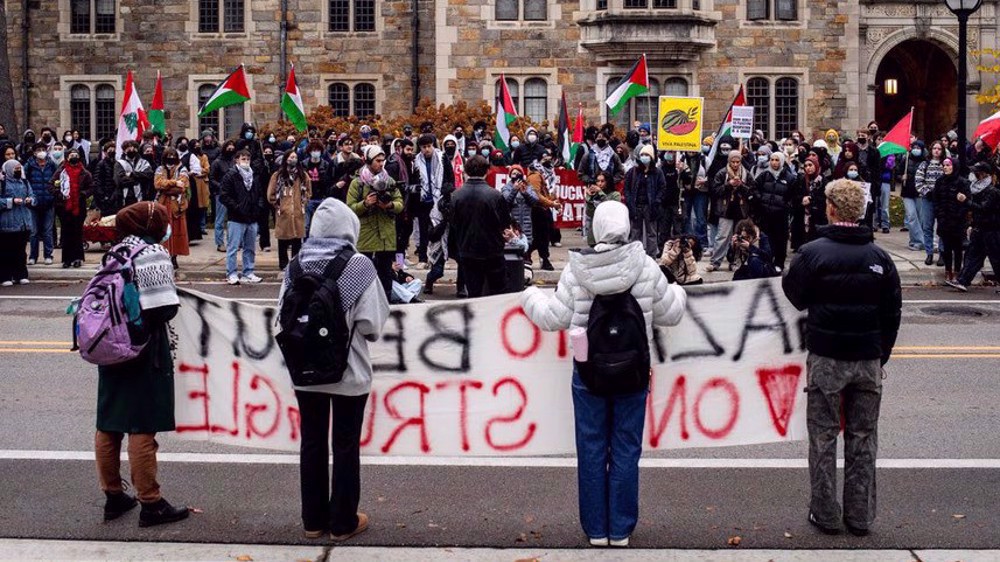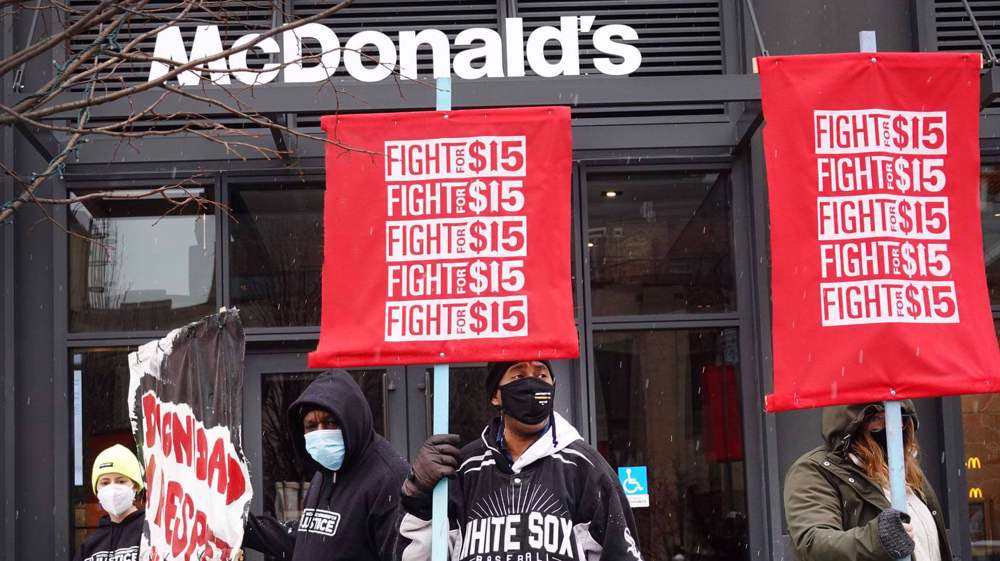US workers go on strike to demand $15-an-hour minimum wage
Low-wage workers at fast-food restaurant chains along with home care and nursing home workers in the US have gone on strike to demand a raise in their minimum wage to $15 an hour.
The strikes which occurred in 15 cities on Tuesday come as the Biden administration is trying to push through a rise in the federal minimum wage from $7.25, which would be the first increase in since 2009.
Charleston, South Carolina; Chicago; Flint and Detroit, Michigan; Raleigh and Durham, North Carolina; Houston; Miami, Orlando, and Tampa, Florida; St. Louis; Oakland, Sacramento, and San Jose, California; and Milwaukee are the cities where the strikes took place.
Since 2012, the Fight for $15 movement has been organizing strikes in a bid to push for state and local minimum wage rises and an increase in the federal minimum wage to $15 an hour.
“We hear you out there applauding essential workers. We see the big show you make of thanking us. But to be honest, that hasn’t translated into changes for my life. We were living on a razor’s edge long before Covid-19 hit South Carolina. And we’re living on it still,” said Taiwanna Milligan, a McDonald’s worker in Charleston who makes $8.75 an hour after working at the restaurant chain for eight years.
Fast-food workers in Durham are on STRIKE for higher pay, safe workplaces, and respect on the job. We're also on Zoom with our allies from across the midsouth in the #FightFor15 pic.twitter.com/z69bwt9qMo
— Fight For 15 (@fightfor15) February 16, 2021
Another worker, Ieishia Franceis, who works at Freddy’s Frozen Custards in west Durham, North Carolina for $9.20 an hour, said she needs to save money to be able buy a home and better provide her family.
“A $15 minimum wage would free me up to do a lot of things. My main goal is to be able to save enough money to put a down payment on a house and have home ownership. It would allow me to begin that process. It would allow me to have money left from one paycheck to the next, to provide for my family better as far as food, and allow me to get transportation so I won’t have to take the bus,” she said.
Franceis and her co-workers once went on strike in October 2020 after their requests for paid sick leave for coronavirus quarantining and testing were denied.
The Families First Coronavirus Response Act passed in March 2020 exempted employers with over 500 employees from offering employees two weeks pay if they needed to quarantine or recover from the fatal virus.
Now Franceis and her co-workers are demanding a $15 minimum wage, hazard pay while they work during the pandemic, as well as health benefits and ultimately a union.
“Sometimes businesses get so caught up in doing business that they forget who runs their businesses. We’re going to keep fighting and not going to stop until we get all the equality we’re fighting for,” added Franceis.
“Congress needs to put our money where their mouth is. During their campaigns, they said they were going to raise the minimum wage to $15 an hour. Live up to what you said. We shouldn’t have to wait until next year or the next year. The bill is there. Just pass it and be done with it.”
The strikes come as a proposal to increase the federal minimum wage to $15 an hour by 2025 is included in the pandemic relief package House Democrats seek to pass and send to the Senate over the next two weeks.
President Joe Biden said in a CNN town hall in Milwaukee, Wisconsin, on Tuesday that “I do support a $15 minimum wage.”

“I think there is equally if not more evidence to dictate that it would grow the economy in the long run and medium run, benefit small businesses as well as large businesses and would not have such a dilatory effect, but that's a debatable issue,”
The legislation still faces potential hurdles in the Senate as it will likely have to use a certain parliamentary procedure for passage, and the wage hike will have to be dropped.
Also, the legislation is still being opposed by some Democratic senators like Joe Manchin of Virginia and Kyrsten Sinema of Arizona.

‘Significant’ downturn in Americans’ support for Israel: Poll

Three killed, three injured in mass shooting incident in Virginia

US revokes another university student visa ‘without explanation’
Ex-official: US cares about human rights only to target adversaries
'Not much time left' to save Palestinians, warns UN Rapporteur
Scholar: Without strong response, Arabs risk falling under Israeli control
VIDEO | Press TV's news headlines
1,000 Israeli aircrew defy threat of sack to urge end to Gaza war
Trump decimates US healthcare
MP: Hezbollah weapons ‘internal matter’ amid US pressure to disarm
Iraq's Kata'ib Hezbollah: Disarmament reports 'lies and fabrications'











 This makes it easy to access the Press TV website
This makes it easy to access the Press TV website